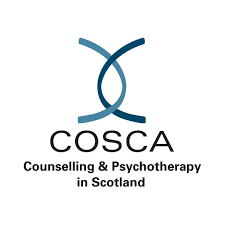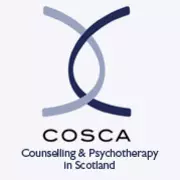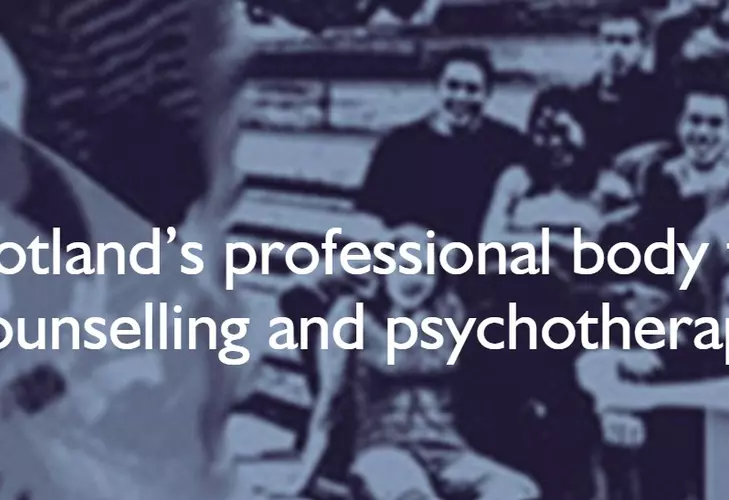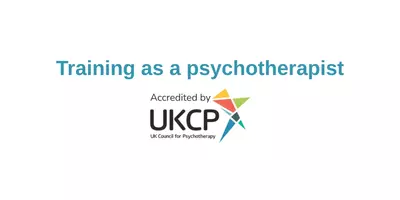
12 Jun 2025 ● COSCA (Counselling and Psychotherapy in Scotland)
Pathways to becoming a Counsellor or Psychotherapist with COSCA

Introduction
COSCA (Counselling and Psychotherapy in Scotland) is Scotland’s professional body for counselling and psychotherapy.
If you're based in Scotland and are considering setting out on this journey, this article will:
- invite you to consider the setting(s) in which you would like to practise as a counsellor or psychotherapist
- explain some of the training pathways or routes that you can take to become a counsellor or psychotherapist, and possible funding sources
- advise on employment opportunities
- provide a list of useful contacts.
DOWNLOAD THIS COSCA GUIDE
Workplaces of Counsellors and Psychotherapists
Counsellors and psychotherapists work in a range of different settings in organisations and independent practice across the voluntary, statutory and private sectors.
The questions below are offered to help you consider the setting(s) that you would like to practise in. The answers to these questions will help to determine the level of training and experience you will need to practise ethically.
Do you want to use counselling skills or the counselling approach in your present work?
Some people may wish to learn to use counselling skills or a counselling approach within their current work. Social workers, care and health workers, advice and guidance workers, teachers, mentors, befrienders, mediators and pastoral care workers are examples of workforces in which counselling skills can be used to great effect. With further training in counselling and/or psychotherapy, the use of the counselling skills can be extended into a career in counselling/psychotherapy.
Do you want to work as a counsellor or psychotherapist within an organisation?
There are many opportunities in Scotland to work as a counsellor/psychotherapist in an organisation. Counselling organisations work at local and national levels and across the voluntary, statutory and private sectors. Counsellors and psychotherapists are engaged by these organisations in paid and volunteer capacities. Working within an organisation has many advantages:
- many organisations offer specialist training e.g. in relationship or alcohol counselling
- some organisations provide training at no cost to the counsellor in training
- all organisations provide practice opportunities and a support structure
- most organisations provide opportunities for continued training and development
- many organisations provide counselling/psychotherapy supervision at no cost to the counsellor/psychotherapist
- some organisations have an internal system of accreditation of counsellors/psychotherapists
- all organisations that are members of COSCA operate within the COSCA Statement of Ethics and Coder of Practice.
Do you want to work as a volunteer counsellor/psychotherapist?
Working as a volunteer counsellor/psychotherapist can be a very rewarding and enriching experience, with very positive outcomes for clients. Most counselling services expect a basic number of volunteer hours per week and some services may pay for additional hours at a sessional rate.
Some counselling organisations offer free training or training at a reduced cost, while others charge the full training fee. A range of Scottish organisations offering training and practice opportunities to volunteer counsellors/psychotherapists are listed in the useful contacts section at the end of this leaflet.
There are many local projects that offer opportunities for volunteer counsellors, but these may have limited resources to provide training for the volunteers.
Some national organisations maintain a system of internal accreditation, supervision of counselling practice and continued professional development for their counsellors/psychotherapists. Many other organisations welcome voluntary input from qualified counsellors, but may not have the same resources to train, supervise and accredit their workers. Some volunteer counsellors / psychotherapists working within organisations embark upon additional training to help them develop counselling / psychotherapy into a full or part-time career.
Do you want to become an independent counsellor/psychotherapist with your own clients?
People wishing to be employed as a counsellor/psychotherapist and/or work in independent practice with their own clients would typically gain professional training that would allow them to practice ethically and to become professionally accredited with a professional body such as COSCA.
COSCA usually expects this training to include the COSCA Counselling Skills Course (or equivalent) and a diploma in counselling/psychotherapy.
Training to Become a Counselling Skills User
If you wish to train to become a counselling skills user, you can do this by completing the COSCA Counselling Skills Course (120 hours). This course has 40 SCQF credits at SCQF level 8. It trains people to use counselling skills in a wide variety of contexts. This training is recommended by COSCA for people using a counselling approach in the support part of their work referred to above.
Most COSCA validated training providers deliver the above course in a face to face format. However, some validated training providers have been approved by COSCA to deliver the above course fully online (real time). Under the ‘profile’ tab in the skills course directory, you can see which providers have this approval.
If you enrol as a student on the course, you are encouraged to apply to become a Student Member of COSCA.
On successful completion of the diploma course, you are encouraged to apply to join COSCA as a Counsellor Skills Member.
Training to Become a Counsellor/Psychotherapist
Independent Counsellor/Psychotherapist
If you wish to train to become a counsellor or psychotherapist, COSCA advises you to complete the COSCA Counselling Skills Course and then a Diploma in Counselling.
You can make contact directly with providers of your choice regarding costs, delivery times, selection etc.
Most COSCA validated training providers deliver the Diploma course in a face-to-face (in person) format. However, some validated training providers have applied for and been approved by COSCA to deliver the above course in blended format. This means that up to 30% of the diploma course can be delivered fully online (real time) and the remainder delivered in a face-to-face (in person) format. Under the ‘profile’ tab in the skills course directory, you can see which providers have this approval.
As a student on a diploma course, you are encouraged to apply to join COSCA as a Student Member.
On successful completion of the diploma course, you are encouraged to apply to join COSCA as a Counsellor Member and as such become listed as a registrant on the COSCA Register of Counsellors and Psychotherapists.
Counsellors working within a COSCA Member Organisation
Counsellors and psychotherapists who work in a paid or volunteer capacity for an organisation that is a member of COSCA are expected to have successfully completed a programme of integrated core training in counselling (minimum of 150 contact hours) approved and/or delivered by an Organisational Member of COSCA for the training of its counsellors.
Individuals who have completed this training also need to be currently practising as a counsellor with the organisation that trained them, or a similar Organisational Member of COSCA, and have their training and current involvement in counselling practice endorsed by that organisation.
Understanding and comparing academic levels of training courses
COSCA does not require counselling and other training courses that it validates to have been academically validated. However, many training providers, along with COSCA itself, have decided to apply to have their courses credit rated by the Scottish Qualifications Association or Higher Education institutions e.g. universities and mapped onto the Scottish Credit and Qualifications Framework (SCQF).
SCQF is Scotland's national qualifications framework and provides a way of recognising, describing and comparing the difficulty and notional time taken to achieve of a wide range of qualifications and awards being taken in school, college, university, workplaces and the community. Qualifications are described using two numbers. The SCQF level describes the level of difficulty of a qualification and the number of SCQF credit points describes the number of notional hours required to achieve it. One SCQF credit point equals 10 hours of learning.
The SCQF Framework Diagram allows you to see where mainstream qualifications sit on the framework so you can compare the level of difficulty of your qualifications. To find out more about the number of SCQF credit points for these qualifications, visit the SCQF Interactive Framework.
When searching on our website for a COSCA validated course, you will see under the profile of each course whether or not its courses have been credit rated and the SCQF level that the courses are delivered at. Knowing this advance may help you to decide which course to apply for depending on whether you wish to be trained at an undergraduate (SCQF levels up to 10) or at post-graduate level (SCQF level 11) if you already have an undergraduate qualification.
Funding counselling/psychotherapy training
The cost of training to become a counselling skills user, counsellor or psychotherapist is a considerable commitment.
The average fees for the COSCA Counselling Skills Course is circa £1,400. The fees for a diploma in counselling range from £5,000 to £18,000 depending on the training provider. Fees vary across providers, and so it is worthwhile contacting providers directly regarding the fees charged.
Funding is not generally or widely available for counselling/psychotherapy training. Some students have employers or charitable organisations willing to award a training grant to meet or help toward the cost of training. However, most students on counselling skills and counselling courses cover the costs or their fees from their own income.
Potential sources of funding
- Access or hardship loans available from training organisations
- Bursaries from colleges or local councils
- Educational trusts and endowments. The Student Awards Agency Scotland (SAAS) has a register of Scottish Trusts and will search its register for you if you complete and submit a REE1 form.
- You can also check the following publications, normally available at libraries, or find out more about the range of sources of funding on the Government website
- The Directory of Grant Making Trusts
- Charities Digest
- The Grants Register
- Scholarships Abroad
- Information on sources of funding from grant awarding bodies
- Sponsorships and scholarships from industrial organisations and government – details from Jobcentre Plus.
- Career development loans – managed by the government through high street banks.
- Disability and Carers Service – if you have dependent children or have a disability, you or your partner may be able to apply for financial help with your studies. Check with the Disability and Carers Service.
- Individual Training Accounts (ITAs) - Participants on COSCA validated courses may be eligible to apply for an Individual Training Account (ITA 200). These accounts give eligible participants up to £200 towards the cost of a course. Applicants need to meet a range of conditions to be eligible including not having a degree, having earnings under a stipulated amount and the course being recognised under the ITA scheme. Please see Skills Development Scotland and Colleges in Scotland for the eligibility criteria and an application form.
- Funding from the Students Awards Agency Scotland - eligible part-time and full-time students can apply for funding for course fees from the Students Awards Agency Scotland (SAAS). The eligibility criteria and an application form can be found on the SAAS website.
Employment opportunities
Paid job opportunities for counsellors/psychotherapists do exist. However, there appears to be more trained counsellors/psychotherapists than there are paid posts available.
Counsellors/psychotherapists trained to diploma level typically may find employment in:
- Voluntary sector projects
- The healthcare sector, for example, as a Cognitive Behavioural Therapist
- Higher and further education particularly in student counselling/psychotherapy
- Community education especially youth work
- Projects involved with counselling young people of school age in schools and in the community
- Social work projects such as drug and alcohol projects
- Independent counselling/psychotherapy organisations
- Industrial settings through employee assistance programmes
The Scottish Council for Voluntary Organisations has a website, Good Moves, that publishes vacancies in the voluntary sector.
COSCA also publishes vacancies on its website.
Average salary
The average salary for a counsellor is about £27,000 per year. Actual pay rates may vary, depending on where you work, the size of the company or organisation you work for, and the demand for the job. Experienced counsellors generally earn more than those starting out and managers of agencies or projects can earn more.
If you are self-employed, you can charge a fee for each session with a client.
Find jobs with Harmonia
Visit our jobs search and filter by location, employment type, industry, occupation or company, to find your pefect fit:
Membership with COSCA
While a student on a counselling skills or counselling course, you can apply to join COSCA as a Student Member.
Once you have successfully completed the training in counselling skills, you can apply to join COSCA as a Counselling Skills member. If you are continuing your counselling training, the more appropriate category of membership would be to remain as a Student member.
Upon completion of the training as a counsellor/psychotherapists, you can apply to join COSCA as a Counsellor Member (Organisations) or Counsellor Member.




